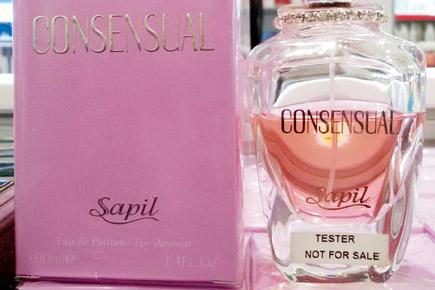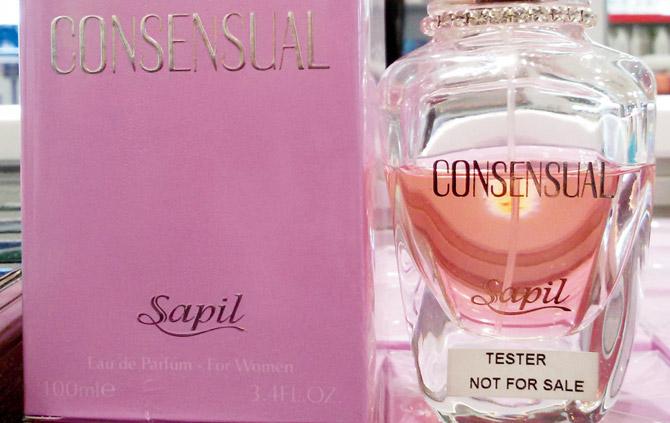India has a particular affinity for unusual scents. We have mridgandha, which is the scent of earth after the first rains. How wonderful to savour such a scent, and then celebrate it with an evocative name.

Sapil's perfume, which is called Consensual. Pic/Meenakshi Shedde
 India has a particular affinity for unusual scents. We have mridgandha, which is the scent of earth after the first rains. How wonderful to savour such a scent, and then celebrate it with an evocative name. In fact, pottering in the bylanes of Jaipur, I once bought a wonderful perfume in a cheap bottle, simply called Mitti, or mud or earth. I was impressed by the jugaad of the person who had invented it.
India has a particular affinity for unusual scents. We have mridgandha, which is the scent of earth after the first rains. How wonderful to savour such a scent, and then celebrate it with an evocative name. In fact, pottering in the bylanes of Jaipur, I once bought a wonderful perfume in a cheap bottle, simply called Mitti, or mud or earth. I was impressed by the jugaad of the person who had invented it.

Sapil's perfume, which is called Consensual. Pic/Meenakshi Shedde
ADVERTISEMENT
Then we have Matsyagandha, or she who smells of fish. Our mythology, of course, includes many versions of the story of Satyavati, daughter of a fisherman, who was seduced by the sage Parashar, as she ferried him across the Yamuna (kya location, boss!). As she was very reluctant, the smart sage offered her four rapid-fire boons: he created a dense mist around the boat; he predicted that their child (later Vyasa) would change the course of history; that she would be renamed Matsyagandha ("she who smells of fish"; really, that's a boon?) and, ahem, that she would get her virginity back afterwards. Phew, some sage. Anyway, even today we have the popular Matsyagandha Express running between Mumbai and Mangalore. And Mumbai's favourite battle-cry on crowded railway platforms is "Machchi ka pani!" ('fish water', that dribbles from the baskets of fisherwomen), in the hope that the dense crowds will somehow part, allowing you to catch your train.
Now, I have a powerful nose that is receptive to the faintest of scents. I love delicate perfumes in nature, but strong perfumes from a bottle give me a headache, so anyone trying to woo me can safely knock perfumes from their list. Throughout my childhood, if memory serves right, our family basically had one 'proper' perfume bottle, Prophecy (I now learn it's a cologne spray), which we kanjoosly sprayed on only for important weddings and such. You didn't need more, because, in those days, the bride's and groom's families stood at the reception gates, sprinkling rose water on you, and applying a dab of attar from a little silver holder, on the back of your palm, after which you rubbed the back of your palms together.
Recently, while I was killing time at Dubai airport duty-free, I was fascinated to observe what the Arabs and Westerners valued in perfumes, including scents and names. One Emirates perfume, made by Sapil, was in a beautifully shaped pink bottle, but was called Consensual. Aargh! I thought. It could have been something beautiful in itself, but the name was hard to love, given that perhaps millions of rapists in India have been allowed to go scot-free, claiming it was 'consensual'. Rasasi also had an eau de parfum called Chastity Woman. The Middle East, it appeared, loved to play the virginal innocent, while the West loved to play it raunchy.
If the chips were down, I thought, I could always consider an alternative career in inventing perfume names and florid copy. Al Haramain offered Desert Rose; Wishah Perfumes, Dubai, had Royal Mirage and Insurrection; Sapil had Disclosure; while Samawa proffered a 'Vurv Revolt Women' (don't ask). The mostly Western perfumes included Playboy's Play It Sexy, Celine Dion's Sensational, Adidas' Born Original, Miss America's Tea Rose, Touch Me's Hot Femme and Hey You's D'Infinite Femme. But Maryaj, popular in the Middle East, had a Golden Wheel perfume for men in a bottle shaped like a black tyre wheel with a golden hub cab, for men who must be 4WD types in bed, I suppose. The old familiar Brut and Yardley of London had been elbowed into a corner by these arrivistes.
I discovered that oud, secreted by the agarwood tree, is highly prized among Middle Eastern perfumes. Their perfumes had evocative names – Oud Ehsasi, Tasmimi Oud, Muklath Ehsasi and Mukhallat al Arais, and I wished someone could translate the names for me. But the store's Chinese staffers were laser focused on perfume targets, rather than poetic perfume names. Anyway, I loved it when Sapil, at one point, exhausted from thinking up extravagantly sexy names, simply acquiesced to Nice Feelings.
Meenakshi Shedde is South Asia Consultant to the Berlin Film Festival, award-winning critic, curator to festivals worldwide and journalist. Reach her at meenakshishedde@gmail.com
 Subscribe today by clicking the link and stay updated with the latest news!" Click here!
Subscribe today by clicking the link and stay updated with the latest news!" Click here!







